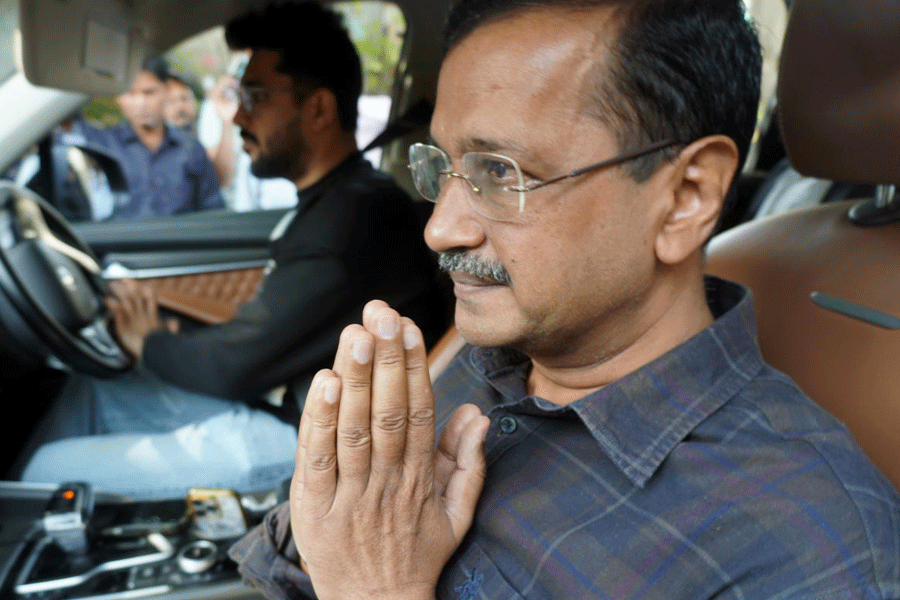 |
| Sarita (left) and Mahesh with villagers |
Shabdo, Jan. 28: Lalti Devi hadn’t known what her daughter was doing in a south Bihar village when Sarita was alive.
When the 70-year-old stepped into Shabdo this afternoon following the trail of a mother’s grief— four days after her daughter was felled by assassins’ bullets — realisation confronted her in the shape of a recently-built community hall.
“Sarita bahen- Mahesh bhaiya amar rahe” — read a poster stuck on the wall of the building.
Mahesh Kant was killed along with Sarita on Saturday evening while they were returning to a guesthouse near here on a motorcycle. The two — in their early thirties — had started a non-government organisation for community work in the area.
“It is because of this that my daughter used to feel restless when she was away and would rush here. She would argue with me: ‘I am not here to cook food and bring up children,’” Lalti Devi recalled.
A part of Sarita was rediscovered today not by her mother alone. Lalti Devi was accompanied by her son-in-law Pushpendra and her grandson Amrit Kumar. For them, too, this was the first visit to Shabdo.
From Paharpur station, the road skirts the village but a huge roadside hoarding announces: “Welcome to Shabdo.”
At the entry point lies a huge piece of low-lying land — dry two years ago, and now a vast watery expanse that the villagers use for pisciculture.
Water flowed in after a defunct canal was dug out. A few metres away is a complex holding a community hall, rows of offices, a meeting room and guest room — all built at the initiative of Sarita and Mahesh.
On the wall of this building are written the 10 commandments of social change that include prohibition, total literacy and community farming.
“Our first breakthrough was when we decided to remove the boundaries of the paddy fields (to allow community farming),” said Sailendra Kumar, a villager.
The village is in mourning for 10 days. At night the villagers stay awake, terrified after the killing of their leaders.
Amrit, who studies in Patna, asked his father as he toured the village: “When she was doing this much for the people here, why was she killed?”
It was a question Laloo Prasad Yadav asked, too, when he visited Shabdo — a Yadav-dominated village — yesterday. For a leader bred on Bihar’s caste politics, it appeared as a puzzle he couldn’t solve. “What Sarita and Mahesh have done here, we should have started preaching long ago. But why should they have to die?” villagers quoted him as saying.
“He stood silent for some moments when we said that the two were killed by a Yadav gang,” said Nitish Yadav, a villager. “And then he nodded and said, ‘Hame malum hua. Koi bhi ho, neta or party worker, kisi ko baksha nahi jayega (I have learnt that. Whoever the killers — leader or party worker, no one would be spared)’.”
Laloo Prasad, who was here for three hours, looked over all the small units of this laboratory for change, referring to Sarita as “mother” and Mahesh as “brother”.
He asked the village women if the two were the architects of what he had just seen. When they nodded in agreement, he promised to back all the projects conceived by “Sarita-ma”.
It was not an assurance the villagers are looking for now. They suspect the hand of the local MLA, Shamdeo Paswan, who belongs to Laloo Prasad’s party.
Paswan, accused in a couple of criminal cases, is allegedly in league with a Yadav gang now being run by Budhan Yadav and Satyendra Yadav alias Sadhu.
This gang is suspected to have killed Sarita and Mahesh because the work they were doing clashed with the interests of powerful local people.
In the presence of Paswan, the villagers complained against him, demanding his removal from the constituency.
“If Budhan and Sadhu were not getting political support, why were they not arrested even after they killed a police inspector, Krishna Singh, in November 2003?” Sandhya, a village woman, asked Laloo Prasad.
“We don’t want anything, Lalooji, from you. We have everything. Hang the killers,” the villagers pleaded with the leader who made his name from Yadav empowerment.











